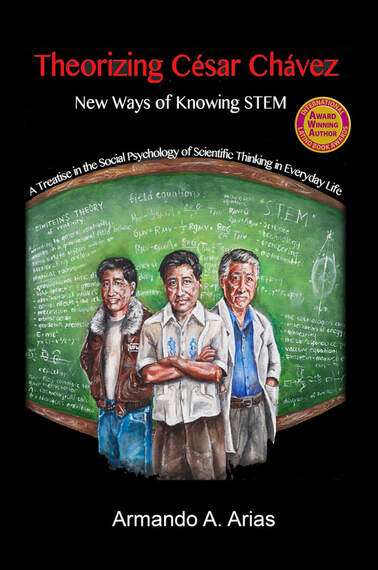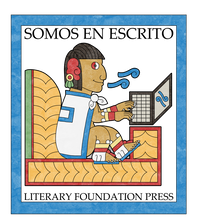Theorizing César Chávez
|
"Theorizing Cesar Chavez is an intriguing portrait of Cesar Chavez...Using him as a heroic defender of a more just approach to the STEM curricula is engaging on several levels. He was unquestionably a man of the people, the poor people especially; but he was also riven with contradictions as a labor leader, community organizer, father, jazz aficionado, guru, and (in the minds of some followers) a would-be saint."
Luis Valdez Founder of El Teatro Campesino |
"In Theorizing César Chávez: New Ways of Knowing STEM, Arias has provided imaginative and critical insights into understanding that César’s values and way of seeing, reflecting and interacting with the world are key to the continued healthy development, sustainability and regenerative essence of our world and of people, both within our nation and our world."
Robert deVillar |
(Review by fictitious writer)
The author presents lessons in a new science and new ways of knowing traditional STEM fields of study: science, technology, engineering and mathematics, but also within the social and psychological contradictions of three Self’s (in a social psychological sense): he presents in César Chávez: a young César, a César at the time of his death, and a César who might have been, older with a Ph.D. in science.
“Dr. Sonny Boy” (as César called him) says in a personal revelation that “he heard from César Chávez,” who encouraged him to create a “theory of theorizing” by infusing César’s values and beliefs as the overlay of a new paradigm for examining and analyzing science (especially, fields found in STEM). Sonny Boy loves to cause confusion, contradictions and crosswinds in forging ideas between the arts, humanities, social and behavioral and hard sciences; this is why the idea of theorizing César Chávez is so intriguing because this approach to idea development will no doubt be found as original, visionary and inspiring. In constant search for techniques to train the imagination, Dr. Sonny Boy introduces science friction, his approach to creating a presence in the absence of César Chávez.
You will find this book at the same time riveting and perhaps stranger than fiction. This approach has required the author to produce un-orthodox narratives that exceed the normative conventions of interpreting the life and times of César Chávez and at the same time provides new intersections for the examination of the sciences. By introducing visionary travails, Dr. Sonny Boy takes great liberties with his own imagination by introducing César to his future Self, hence, the act of “theorizing César Chávez.” He creates a lens allowing César critically to examine the state of STEM in American society today.
Que viva César Chávez y que viva Dr. Sonny Boy!
Joaquin Emiliano Inzunza, Nobel Prize in Particle Physics
The author presents lessons in a new science and new ways of knowing traditional STEM fields of study: science, technology, engineering and mathematics, but also within the social and psychological contradictions of three Self’s (in a social psychological sense): he presents in César Chávez: a young César, a César at the time of his death, and a César who might have been, older with a Ph.D. in science.
“Dr. Sonny Boy” (as César called him) says in a personal revelation that “he heard from César Chávez,” who encouraged him to create a “theory of theorizing” by infusing César’s values and beliefs as the overlay of a new paradigm for examining and analyzing science (especially, fields found in STEM). Sonny Boy loves to cause confusion, contradictions and crosswinds in forging ideas between the arts, humanities, social and behavioral and hard sciences; this is why the idea of theorizing César Chávez is so intriguing because this approach to idea development will no doubt be found as original, visionary and inspiring. In constant search for techniques to train the imagination, Dr. Sonny Boy introduces science friction, his approach to creating a presence in the absence of César Chávez.
You will find this book at the same time riveting and perhaps stranger than fiction. This approach has required the author to produce un-orthodox narratives that exceed the normative conventions of interpreting the life and times of César Chávez and at the same time provides new intersections for the examination of the sciences. By introducing visionary travails, Dr. Sonny Boy takes great liberties with his own imagination by introducing César to his future Self, hence, the act of “theorizing César Chávez.” He creates a lens allowing César critically to examine the state of STEM in American society today.
Que viva César Chávez y que viva Dr. Sonny Boy!
Joaquin Emiliano Inzunza, Nobel Prize in Particle Physics
Click for video interview on Theorizing Cesar Chavez
Purchase via Amazon link below
A portion of the proceeds goes to a charity of the author's choice


